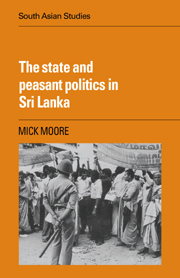Book contents
- Frontmatter
- Contents
- List of maps
- List of tables
- Acknowledgments
- Glossary of Sri Lankan terms
- Maps
- 1 Puzzles and agendas
- 2 Methods, scope and elaborations
- 3 Crown lands
- 4 Land reform
- 5 Pricing and agricultural services
- 6 Categorising space: urban–rural and core–periphery
- 7 A smallholder interest or smallholder interests?
- 8 Rural consciousness
- 9 Ethnic conflict and the politics of the periphery
- 10 The Sri Lankan polity
- 11 Concluding remarks
- Appendix 1 Results of general elections, 1947–77: percentage of parliamentary seats won
- Appendix 2 The myth of the plantation impact on the Sinhalese village: two accounts
- Notes
- Bibliography
- Index
- CAMBRIDGE SOUTH ASIAN STUDIES
2 - Methods, scope and elaborations
Published online by Cambridge University Press: 05 March 2012
- Frontmatter
- Contents
- List of maps
- List of tables
- Acknowledgments
- Glossary of Sri Lankan terms
- Maps
- 1 Puzzles and agendas
- 2 Methods, scope and elaborations
- 3 Crown lands
- 4 Land reform
- 5 Pricing and agricultural services
- 6 Categorising space: urban–rural and core–periphery
- 7 A smallholder interest or smallholder interests?
- 8 Rural consciousness
- 9 Ethnic conflict and the politics of the periphery
- 10 The Sri Lankan polity
- 11 Concluding remarks
- Appendix 1 Results of general elections, 1947–77: percentage of parliamentary seats won
- Appendix 2 The myth of the plantation impact on the Sinhalese village: two accounts
- Notes
- Bibliography
- Index
- CAMBRIDGE SOUTH ASIAN STUDIES
Summary
Introduction
The main argument has been sketched out briefly in Chapter One. The present chapter is devoted to certain preliminary exercises which have to be conducted before the argument itself can be allowed to flow. The first issue dealt with is method. On methods used for data collection little need be said in the main text: the dominant eclecticism will soon become evident. Rather more needs to be said on the concept of ‘objective interests’, which is a contested issue within social science, and central to the argument here. That is followed by an elaboration on various aspects of the main thesis propounded here. After the scope and historical scale of the argument are defined, the chapter concludes with an introduction to Sri Lankan politics intended to justify the claim that the smallholder population wield great electoral power and have available an unexploited moral basis for making claims for government policies more oriented to small-farmer interests.
‘Objective interests’
In defining the analytic problem to be the explanation of an aspect of the political agenda – the dearth of cultivators' occupational demands despite the substantial electoral influence of the cultivating population – I have adopted a particular stance in the wider debate on the nature and extent of political power. This stance is broadly that of radical theorists.
- Type
- Chapter
- Information
- The State and Peasant Politics in Sri Lanka , pp. 12 - 29Publisher: Cambridge University PressPrint publication year: 1985

